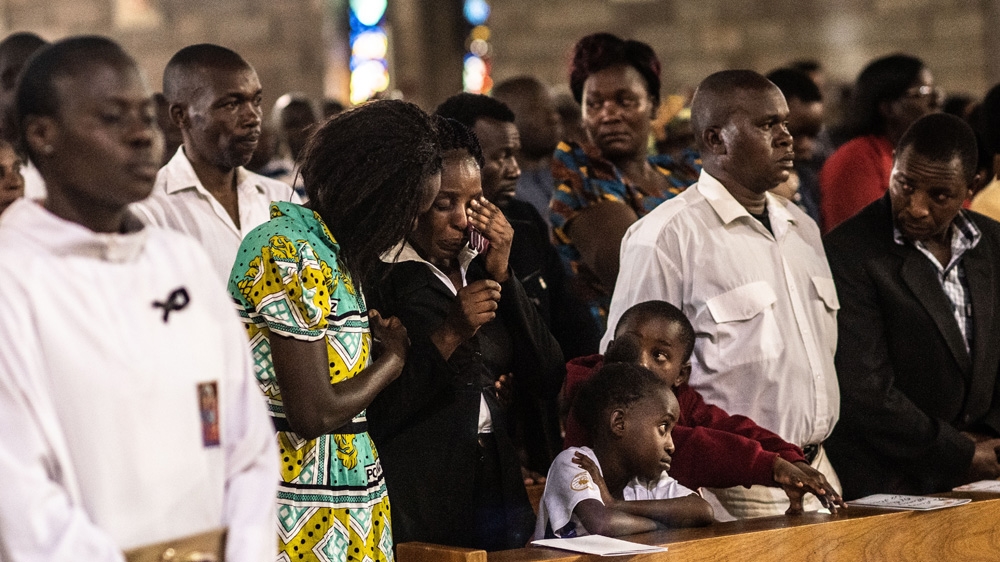A year after DusitD2 attack, grief and pain still linger
Survivors struggle to move past trauma of al-Shabab siege on hotel and office complex in Nairobi that killed 21 people.
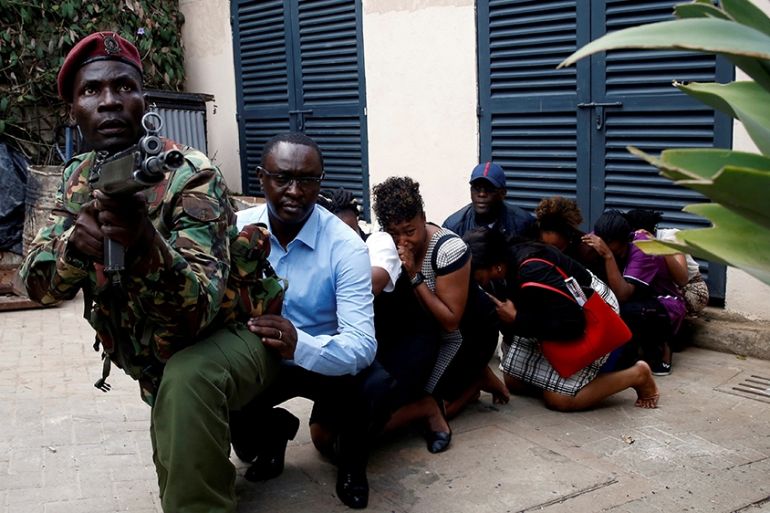
Nairobi, Kenya – Walking through the DusitD2 hotel and office complex in Nairobi today you will see some people heading to their offices, others enjoying meals at various eateries and local and foreign shoppers coming in and out of the premises.
In some ways, it is hard to believe that a year ago 21 people were killed in an attack carried out by fighters from Somalia’s al-Shabab armed group.
Keep reading
list of 4 itemsAl-Shabab claims attack on UAE military in Somalia
Somalia begins ‘efforts to rescue’ UN helicopter crew held by al-Shabab
Al-Shabab captures UN helicopter in central Somalia
Days after the January 15, 2019, raid, civilians were allowed back in the upscale compound. Six months later, the hotel re-opened – business as usual.
But for those who survived the attack on the 14 Riverside Drive complex, memories continue to linger.
Esther Mwikali, head of operations at an innovation and entrepreneurs’ hub at the complex, was in her office when she heard “a deafening sound”.
“Everything shook,” the 27-year-old recalled. “I looked out of the window and I could see smoke. Initially, we thought a transformer blew, then within two minutes, we heard gunshots. A colleague looked outside and said ‘those out there are not the police’,” Mwikali said.
For the next 45 minutes, all Mwikali and her colleagues could hear were more gunshots and people screaming. “I called my mum and she said the media reporting said it was a robbery at the bank – but we knew it was not.”
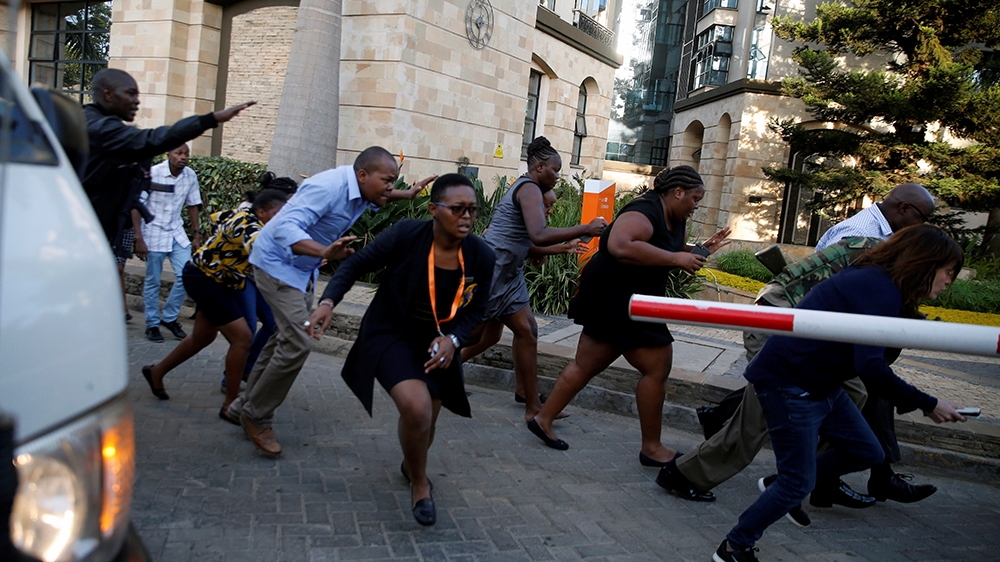
An explosion and suicide bomb marked the start of the attack before gunmen stormed the compound in the upmarket Westlands neighbourhood and began opening fire and throwing grenades.
People ran for safety as the sounds of gunshots and screams went on.
As chaos and confusion reigned, Mwikali and her colleagues barricaded the door and found places to hide.
“One colleague cried about what her son will do without her,” Mwikali said, who curled up under a kitchen sink. “My thoughts were racing, reflecting on my life. My body was frozen … I thought this is it – if the terrorists come in, I hope they shoot me in the head and finish off the job rather than leave me injured. I asked God to keep a place in heaven for me.”
More than three hours later, officers with Kenya’s General Service Unit arrived to lead those who had been hiding away from danger. The floors were covered with shattered glass and pools of blood and Mwikali, who had removed her high heels anticipating she might have to run from the attackers, had to be carried down by a colleague.
Once out of the building, security forces created a wall around the evacuees. Mwikali found the tears she had held back for hours finally flowing.
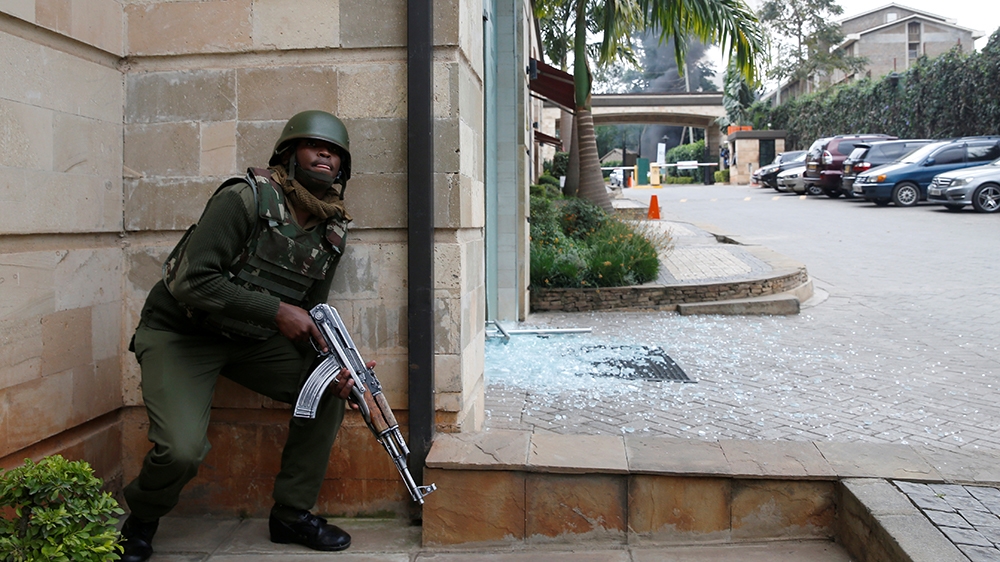
One year on
Some 20 hours after the bloody siege began, the Kenyan government announced the situation was under control and all five attackers had been killed.
Pursued by the media and gripped by trauma, some of the survivors sought help.
Mwikali and her colleague Whitney Ogutu were able to get support through therapy arranged by their employer. But they found that living through such an ordeal entails facing the reality that it can never quite be forgotten.
“At the most, you go a day or two without thinking about it,” Ogutu said. “Sometimes I look outside and see where one suicide bomber blew himself up and all of a sudden it’s as if I am transported back to that moment.”
For the 24-year-old, who like Mwikali returned to the office six weeks after the attack, loud noises from fireworks, thunderstorms and even car alarms continue to be a trigger.
“There are certain things we find ourselves doing now which we never did before – for example when I enter a place, I immediately look for the exits and safe spaces to hide,” Ogutu said. “The aim of terrorists is to scare people – and it works.”
The situation is similar for Maryam Hassan, a 34-year-old IT consultant who had gone to the hotel and office complex for a meeting that day and lost a friend in the attack.
“I cannot go back to Dusit – just driving past leads me to panic. I remember seeing blood and body parts everywhere,” she said. “Everyone says ‘you can’t let the terrorists win’, but the grief and trauma are so exhausting. For months after the attack, I would pick up my phone to call my friend and then remember, he is not here any more. Nothing left, just memories.”
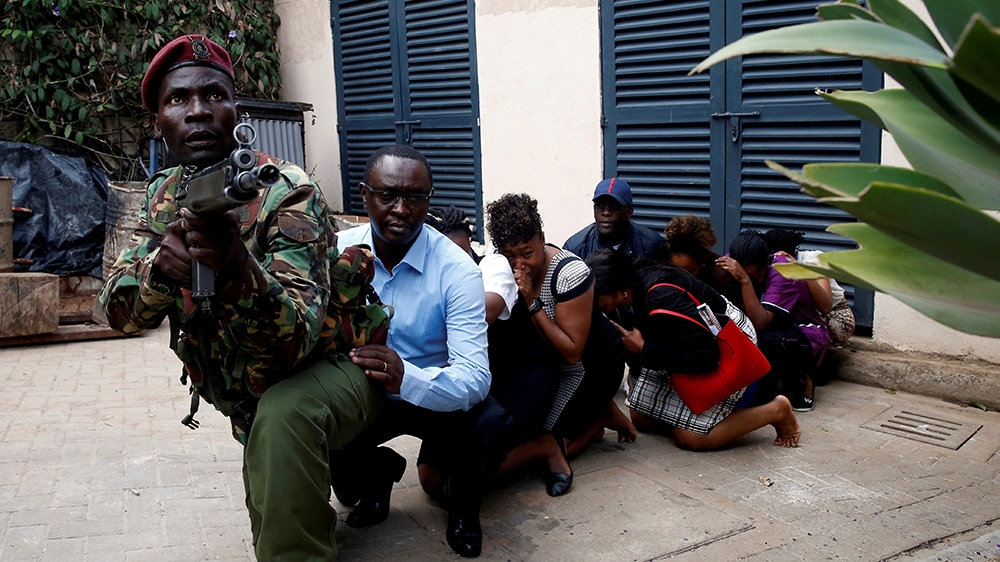
Recent attacks raise questions
According to a statement by Edwin Okollo, head of Kenya’s civil rights and counterterrorism division, six people face various charges in connection with the Dusit attack. A pre-trial hearing is scheduled to take place on January 28.
The marathon siege echoed a 2013 attack that killed 67 people in the nearby Westgate shopping centre – just two of several al-Shabab attacks in Kenya, which in 2011 sent troops to neighbouring Somalia to fight the al-Qaeda-linked armed group.
This month alone, there have been five suspected al-Shabab attacks in Kenya, including one against a school in Garissa county that left three teachers dead and one against a military base used by US and Kenyan forces that killed a US servicemember and two contractors.
“I hear of these attacks and I don’t feel safe,” Ogutu said. “I realise that al-Shabab is bigger than just a handful of attackers running riot, so I understand the challenges in dealing with them, but these attacks are scary.”
According to Tabitha Mwangi, head of the security programme at the Centre for International and Security Affairs, attacks such as the one against the base hosting US soldiers seek “to make the group appear stronger than it is.”
Mwangi said the government is working hard to keep the country safe, pointing to the recent arrest of three men suspected of trying to break into a UK army camp in central Kenya.
“Security agencies are alert,” Mwangi said. “There are, however, loopholes to be sealed.”
But for people like Mwikali, the frequency of the attacks remains a source of anger.
“I feel like the government hasn’t learned,” she said. “My mum is a survivor of the [al-Qaeda-claimed] 1998 US Embassy bombing in Nairobi, I’m a survivor of this – more needs to be done.”
